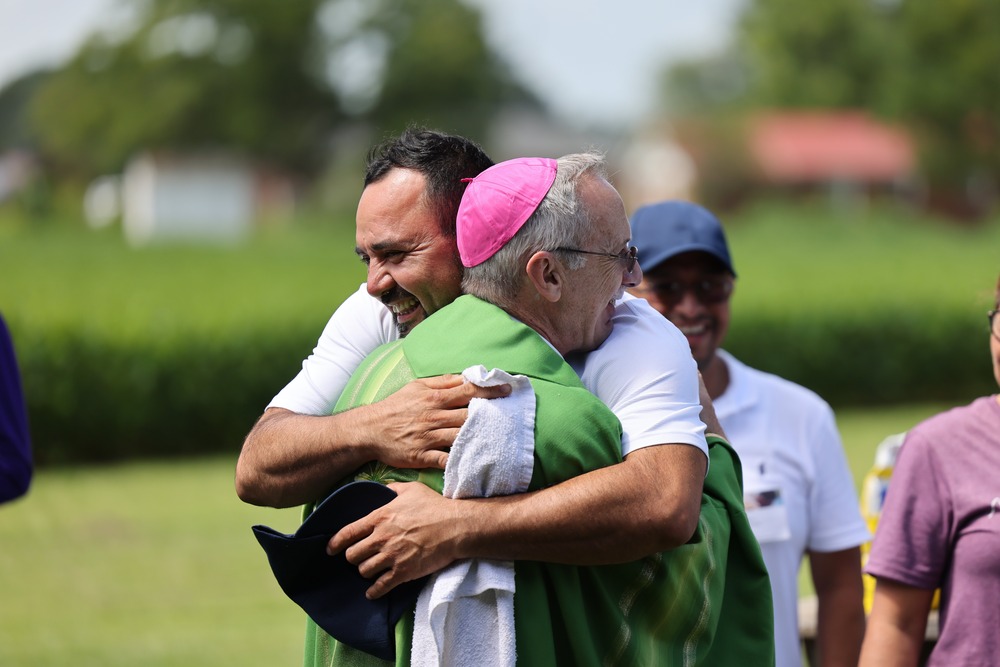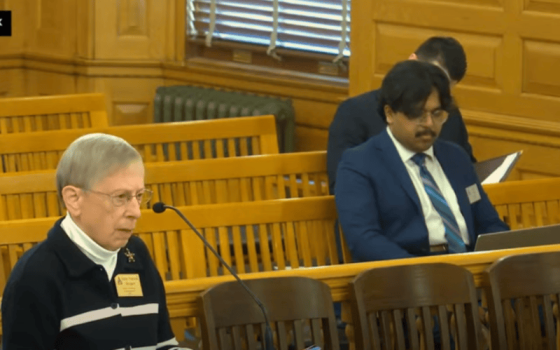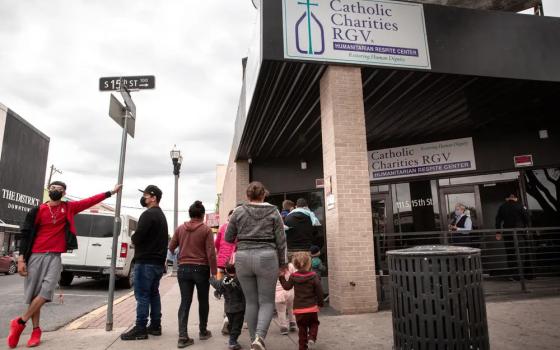
Bishop Luis R. Zarama of Raleigh, N.C., hugs an attendee of the XIII Encuentro Católico de Campesinos on Aug. 4, 2024, an annual event for farmworkers in the diocese, many of whom are temporal H-2A agricultural workers. About 300 workers and volunteers participated this year. (OSV/courtesy of USCCB Public Affairs)
As volunteers from a rural parish and farmworkers mostly hailing from Mexico set up for an outdoor dinner next to a tobacco field in Colerain, they put a cake on the long table with food that said, "Dios Camina con su Pueblo."
Those words, "God walks with his people," encapsulate what many volunteers try to show farmworkers in the Diocese of Raleigh through their visits.
"It is a Christian duty to accompany them," said Father Jairo A. Maldonado-Pacheco, pastor of St. Ann Church in Edenton, who was one of the priests there to talk to the workers and give them a blessing. "Whenever we go, we let them know that we are their family here, that they can count on us. That as far as we can, as a community, we will help them to meet some of their basic needs. ... We want to share with them the faith and the joy of believing in Jesus."
The priest explained that St. Ann and another parish in the county typically go to the worksite to celebrate Mass once a month. The different parishes that engage in migrant ministry in the diocese remind the agricultural workers — primarily men coming from Mexico who grow and harvest the fruit, vegetables, and other crops in North Carolina, often under the blazing sun — that they are not alone.
Participants from the U.S. Conference of Catholic Bishops, the Catholic Migrant Farmworker Network, and Raleigh parishioners and local labor advocates witnessed these efforts during an Aug. 1-4 pastoral visit organized by the USCCB's Subcommittee on Pastoral Care of Migrants, Refugees, and Travelers, or PCMRT.
The PCMRT delegation members visited some of the places where seasonal agricultural workers live and work, saw how different Raleigh parishes carry the mission to accompany the farmworkers, and asked experts and advocates questions about policies and how to face current challenges. Most of all, they witnessed the workers' faith amid difficulties.
They also heard a series of presentations on realities, best practices, current policies and pastoral insights by diocesan and national leaders at the Catholic Center in Raleigh.
The Diocese of Raleigh — which, according to the diocesan website has a Catholic population of nearly 500,000 Catholics (with over 222,670 of them being registered parishioners) — has an active migrant farmworker ministry because of its steady H-2A worker presence. The visa program allows foreign agricultural workers to work in the U.S temporarily.
According to the U.S. Department of Labor, North Carolina was the fifth state in terms of the number of H-2A guest workers it received in 2022 and 2021. Between 14,000 and 17,000 H-2A workers live there from April to November to work in tobacco, sweet potatoes, blueberries, cucumbers, melons, tomatoes, Christmas trees and other crops.
During the PCMRT visit, St. Ann volunteers told delegates about the parish's years-long ministry of supporting migrant communities. Kathy Martinez-Walsh, who coordinates this effort, said the members of the St. Vincent de Paul group — which supports the migrant initiative — do not speak Spanish, but the difficulties "communicating with the gentlemen" they meet is not a deterrent to help.
Maldonado-Pacheco said that about 15 workers come to the monthly Masses they organize and that they are joined by the parishioners of St. Ann and Holy Trinity Catholic Church in Williamston, which is administered by Father Viyaja Katta, of Glenmary Home Missioners. Sometimes there are 45 people, including parishioners' families and often a choir from another parish comes to the workcamp for a "beautiful and dignified" Eucharistic celebration, Maldonado-Pacheco told OSV News. In addition to the support of the St. Vincent de Paul group, he said, a lot of his Hispanic parishioners are involved with cooking and organizing. There are confessions before Mass, a dinner afterward and, lately, some games.
Like his parishioners, Maldonado-Pacheco said the parish benefits significantly from these interactions. "They receive our company, our affection, and we also receive from them the testimony of hard work, honest work, the sacrifice that is made for (their) loved ones," he said.
That sentiment was shared by people like Daisy Tavares, who, with her husband, is part of a Glenmary Home Missionaries team in the area and has been accompanying migrant families and migrant workers in North Carolina for three years.
"Sometimes, the food arrives at our table, and we do not value it; sometimes, we forget about the sacrifice of our brothers," she said.
Advertisement
Most of the workers the delegation talked to during the visit mentioned how they missed their families and how painful it was to be apart from their loved ones year after year. This was at least the seventh season for a lot of the workers, and for most of them, the reason they were here had a first name and last name. Yet, sometimes, they would have to miss some of the milestones their work brought about — like graduations, home improvements, or birthdays.
Other workers talked about how pesticides or chemicals from the crops affect their health — such as those working in tobacco fields. Many said that their living conditions were OK — but talked about hearing (or previously experiencing) workcamps that would cram many people in houses without adequate plumbing, with broken windows or appliances, or in trailers that would get too hot in the summer without air conditioning. Others shared how some bosses or crew supervisors would push workers beyond what was reasonable, mistreat them, or even charge them for things that, according to the H-2A program, should not be covered by the workers themselves.
During the pastoral visit to North Carolina, all the farmworkers who shared their testimonies talked about the hard work in the heat for several hours, which gets more challenging with the humidity in North Carolina. This summer, like in years past, several counties in North Carolina had several advisories and warnings for excessive heat, with the heat index being consistently in the 90s Fahrenheit and often reaching triple digits and breaking record-high temperatures, according to local media. Even at night, temperatures often remained in the high 70s degrees and, in some cases, it would reach the 80s by 9 a.m.
Like most states, North Carolina has no standards or regulations about working in extreme heat, and the federal government's heat safety recommendations are not always followed. Often it is up to the workers' bosses or supervisors to make sure water breaks and rest are implemented, and to make the call when it would be safer for workers to leave the fields.
The number of certified H-2A positions has grown in the last two decades due to persistent farm labor shortages, according to an article that was originally published in Southern AG Today. And an analysis from the American Immigration Council noted that between 2017 and 2022, the number of H-2A workers increased nearly 65%.
In 2022, over 370,000 H-2A agricultural workers positions were certified by the Department of Labor — which increased slightly in 2023. According to the U.S. Department of Agriculture, about 80% of job certifications result in H-2A visas issued to temporary workers. Thousands of other migrant farmworkers toiling in the fields are in the country without legal permission.
Tavares said that often, migrant communities that primarily work in agriculture are in "forgotten" counties of the state or in places that are two or three hours away from the organizations that could support them.
In the Diocese of Raleigh, some of the ways the church is present is by visiting farmworkers to bring the word of God, items that they need, as well as food and accompaniment. The workcamps where they work and live often do not have Catholic churches around for several miles, and workers do not have means of transportation — and are usually only able to go to a store to get supplies once a week, mostly due to an unpredictable work schedule that sometimes lasts until 6 or 8 p.m., and can include Sundays.
Some church volunteers can visit once a week, and Masses in remote areas often take place every two weeks or monthly. Most of all, volunteers listen to their stories and spend time with them.
Delegation member Teresita Kontos, president of the Catholic Migrant Farmworker Network, said that listening to what people live like in North Carolina touches people's hearts. "We all have different situations (in our regions), but they are not as impactful as what we saw here," said Kontos, whose ministry advocates for the migrant and rural immigrant farmworkers in the Yuma, Arizona, area.
She added that the trip will inform the ways the Catholic Migrant Farmworker Network can better serve others and how to make sure the resources reach leaders serving migrants. "So that the campesinos know that we are here for them. That they are not alone, that the Catholic Church accompanies them," Kontos said.
Also among those in the visiting delegation was Casey Slock, a parishioner of St. Francis of Assisi in Raleigh, about four hours from some of the places the delegation visited Aug. 2. She told OSV News that seeing the sites where migrants worked and lived highlighted the importance of building community and asking — not assuming others' needs.
"Sharing experiences lead us to naturally respond in a way Christ calls us to respond," she said.







